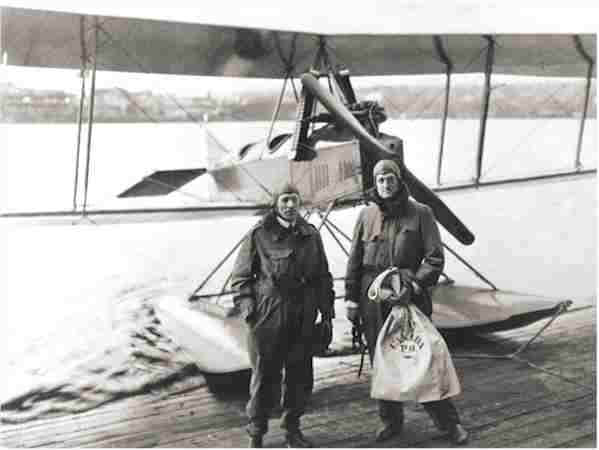 |
|||||
| Home | Research | For Teachers | HISTORY Level 1 Level 2 Level 3 |
PRINCIPLES Level 1 Level 2 Level 3 |
CAREER Level 1 Level 2 Level 3 |
| Gallery | Hot Links | What's New! | |||
| Web Administration and Tools | |||||
 |
|||||
| Home | Research | For Teachers | HISTORY Level 1 Level 2 Level 3 |
PRINCIPLES Level 1 Level 2 Level 3 |
CAREER Level 1 Level 2 Level 3 |
| Gallery | Hot Links | What's New! | |||
| Web Administration and Tools | |||||
![]()
|
Pilot Extraordinaire Born San Francisco, California Born January 3, 1889 - |
Among the great names in aviation history, Eddie Hubbard is all but forgotten. But it was
Hubbard who convinced a military airplane maker William E. Boeing
that money could be made carrying mail and passengers, and thus began what became the
world's largest commercial aviation company.
Hubbard died in 1928 at age 39 from surgery complications, cutting short a career as one
of Boeing's most trusted advisors and as a pilot whose daring skills made many headlines
in Canada and the United States. World War I
air ace Eddie Rickenbacker after seeing Hubbard put on a show over Seattle said,
"Many believe him to be the most skilled pilot in America. I can see where he gets
that reputation."
An orphan, who grew up in San Francisco, Hubbard began his career as a mechanic after
moving to Seattle in 1907. He fell in love with airplanes, earning the first pilot's
license issued in Seattle. He joined Boeing in 1916, just as the company was getting
organized.
Hubbard was a visionary in many ways. He saw the value to business of quick information.
From that, he realized people would pay to have mail flown by airplane. Hubbard carried
his boss as passenger in the first North American
International air mail flight from Vancouver, British Columbia to Seattle, March 3, 1919.
He continued flying mail and passengers across the border from Seattle to Victoria for
seven years. Despite foggy weather over the Strait of Juan de Fuca, he never missed a
flight. The photo below was taken at Boeing's hangar at Lake Union, Seattle March 3,
1919 on the completion of the first North American international air mail flight from
Vancouver, British Columbia to Seattle. Hubbard on the left was the pilot. William E.
Boeing is on the right holding the Canadian Post Office mail bag. There were 60 envelopes
in the bag. If you are fortunate enough to have one it would be worth about $4,300.

The photo shown below is Hubbard's Boeing B-1 flying boat which he used to
fly mail and passengers from Seattle to Victoria, British Columbia between 1920 and 1927.
It was the first commercial airplane built by the Boeing Airplane Company. It
was rebuilt and hangs in the Museum of History & Industry, Seattle.
![]()
In 1927 Hubbard convinced Boeing to bid for the cross-country mail and
passenger route from San Francisco to Chicago. He then convinced the company to resurrect
a 1925 mail plane prototype upgraded with a metal body, more powerful engine and build
twenty-five for the route. That plane, the Model 40, became Boeing's first mass-produced
commercial aircraft. Boeing Air Transport, Inc. was established as part of the sprouting
empire, which was to include United Air Lines.
Eddie Hubbard became vice-president of Operations headquartered in Salt Lake City. This
company made money from day one indicating Hubbard was not only an outstanding pilot, he
was also an astute businessman. Of Hubbard: The Forgotten Boeing Aviator,
authored by Jim Brown, William E. Boeing Jr. writes: "He [Hubbard] was a pioneer in
private air transportation as well as air mail. This book chronicles his
aeronautical career accurately and in detail."
This biography is written by Jim
Brown, author of Hubbard: The Forgotten Boeing Aviator. It is used by
permission
of the author and he retains all rights to the material. It has been slightly
modified by the ALLSTAR network. More material on Eddie Hubbard can be found by
clicking here.
Send all comments to ![]() aeromaster@eng.fiu.edu
aeromaster@eng.fiu.edu
© 1995-98 ALLSTAR Network. All rights reserved worldwide.
Updated: February 23, 1999